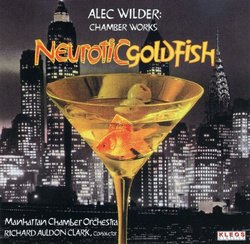Half an Octet is Better than None
Red J. Comb | Chicago, IL United States | 06/21/2002
(4 out of 5 stars)
"Alec Wilder won fans among top singers and musicians as well as lay listeners. His octets for woodwinds, harpsichord, and rhythm created quite a stir when first recorded in the late 1930's. They are still remembered with affection today, by those fortunate enough to have heard the original recordings. They were, however, mostly unavailable on record after the 50's.
"Neurotic Goldfish" presents several of the original octet compositions, as well as some never-recorded untitled ones. This is about the best news a die-hard Wilder buff could hope for.
The selections on this CD are great; some of his best compositions. There are some flaws, however. Unless you were familiar with the originals, you might not notice at all.
One problem is the slow, almost dolorous tempo evident on many of the songs. Wilder's octets were sunny and spry, mixing jazzy swing with classical music (the average time of selections in this collection is about 3 1/2 minutes, about a minute longer than the originals).
Another problem is the slightly muddy sound (to my ears, anyway)of the winds, and a poor balance of instruments. The harpsichord sounds like it's being played in another room.
Still, it's probably unfair to keep comparing this CD to the originals, especially since they are unavailable for comparison. If you fondly remember the old Wilder octets but haven't heard them in decades, you probably won't mind the tempo or the sound so much. And if you've heard of the octets but never heard the music itself, this is certainly a good way to get acquainted. The chance to hear this music again is thrill enough; don't sweat it because it isn't perfect."


 Track Listings (17) - Disc #1
Track Listings (17) - Disc #1